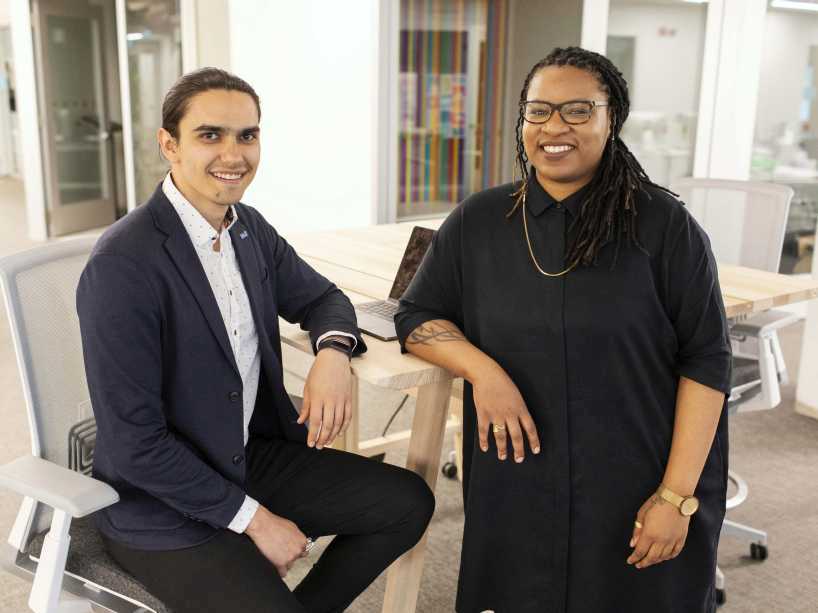Two PhD students receive prestigious Trudeau Foundation scholarships

New Trudeau Foundation scholars Nataleah Hunter-Young (right) and Riley Kucheran. Photo: Alia Youssef
Two Ryerson PhD students, Nataleah Hunter-Young and Riley Kucheran, from the Communication and Culture program, have been named 2019 Pierre Elliott Trudeau Foundation scholars. This prestigious scholarship is awarded to doctoral students doing exceptional work in the social sciences and humanities. They are just the third and fourth Ryerson students to be awarded the honour — Vathsala Illesinghe in 2017 and Nathaniel Brunt in 2018 — are past recipients.
Nataleah Hunter-Young
Nataleah Hunter-Young, who received her master of social work from Ryerson in 2012, has spent the better part of her career as a youth worker with a focus on justice, advocacy, arts education and community development.
In the early 2010s, her focus tightened. The conversation about police brutality in Black communities saw a global resurgence. But this time, many deaths were being caught on camera, and the videos were circulated on social media.
“I remember being online and having to reckon with the weight of this: how real, present and constant this threat against Black people is,” Hunter-Young says. She began loosely examining the phenomenon, considering the frequency, ubiquity, how and when they autoplayed, and the ways other Black people were responding to them. For many people, she noticed, the clips were too much — some people began taking breaks from or avoiding social media entirely.
“Violence against Black people on the state level has been visible for centuries,” Hunter-Young says. “But these videos have changed the public’s relationship to its visibility: not just to know that it exists, but to acknowledge that it is unmissable.”
These observations form the basis of Hunter-Young’s doctoral research. Her background as an arts educator, and current work as a film programmer, have led Hunter-Young to explore the social and cultural impact of these videos by looking to the ways in which contemporary artists have taken up the theme of police violence in their work.
“I think we can learn a lot from artists,” she says. “What can artists and artwork teach us about the ways these videos impact how Black people are seen and imagined, and then, how Black people see and imagine themselves?”
Now in the early stages of her research, Hunter-Young is excited to be given the opportunity and resources to further her studies on what she considers to be an urgent matter. “Being selected as a Trudeau scholar really means having access to an incredible community of scholars and fellows who have demonstrated a commitment to leadership and social change,” she says. “It means a lot to be in a position where I can make this research intentional and international in the way that it really needs to be.”
Riley Kucheran
Indigeneity has been central to Riley Kucheran’s work since 2016, when, as a master’s student in communication and culture, he joined Ryerson’s School of Fashion to help Indigenize its curriculum. At the time, he was exploring how clothing was used in the residential school system as a weapon of colonization. But since then, Kucheran has stepped away from researching historical traumas and into more hands-on practice.
“The work I’m focusing on now is about building a community of Indigenous designers across Canada, Turtle Island, and even beyond,” Kucheran says. “I’m interested in what young designers need from a management perspective. How can we, as a country, support Indigenous designers? How can Indigenous design reshape our relationship to clothing?”
Kucheran is planning to launch the Canadian Council of Aboriginal Design, an organization that will extend the necessary tools and resources Indigenous designers might need to make their businesses self-sufficient. He understands that the mainstream Canadian fashion industry has not been conducive to the success of all designers.
“Cultural appropriation is one of the larger challenges that face Indigenous designers, because we haven’t been in control of the narrative,” Kucheran says. “I think what I’m doing with my research and, say, what Sage Paul is doing with Indigenous Fashion Week Toronto, is confronting that and trying to gain the ability and platform to tell our own stories, and to showcase Indigenous culture authentically.”
“We’ve had Indigenous designers for thousands of years. It just hasn’t been considered ‘fashion.’”
The project grew out of a three-month period Kucheran spent working with Angela DeMontigny, a Cree/Métis fashion designer who, 10 years ago, tried to start the work he is now engaging in. In his work, Kucheran sees himself less as a singular researcher than a person who is facilitating networks between people who can push the Indigenous design industry forward. “This isn’t the Riley Show. This is a community effort. I may have won the scholarship, but it really takes a community to do this work.”
Kucheran feels especially honoured by the Trudeau Foundation as the first fashion scholar to be selected for the program. “Fashion has, historically, been marginalized as a field,” he says. He notes that, in the world of academia, fashion studies have been alternately feminized and delegitimized. “I think the Trudeau Foundation selecting me says that fashion is important. Fashion is a big deal. Fashion is destroying our planet; it can also be a site for change.”
Awarded by the Pierre Elliott Trudeau Foundation, external link, the scholarships provide a $60,000 annual package, including a $20,000 travel/networking allowance to facilitate fieldwork, research initiatives and conferences.
Source: Ryerson Today
